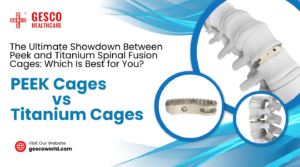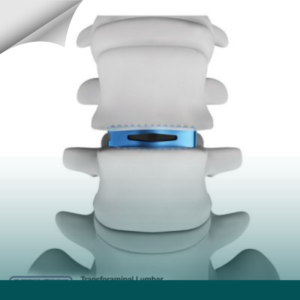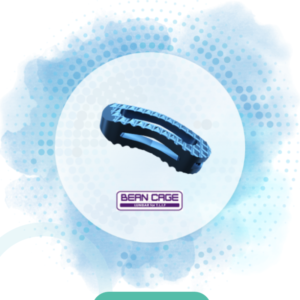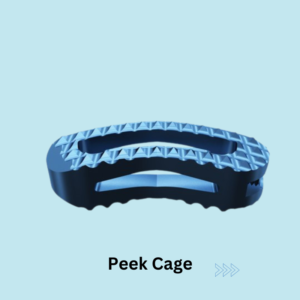The Ultimate Showdown Between Peek and Titanium Spinal Fusion Cages: Which Is Best for You?
Interbody spinal fusion cages are widely used by surgeons to treat spinal instability, correct deformities & fractures, reconstruct the spine, treat spinal tumors, and much more. The effectiveness, performance, and efficacy of these spinal cages depend significantly on the material used in constructing spinal cages. The most commonly used materials for spinal cages are Polyetheretherketone (PEEK) and surgery-grade titanium. Both PEEK cages and titanium cages have their own sets of benefits and drawbacks.
In this blog, we will deep dive into PEEK cages vs titanium cages, and help you understand how to choose the right spinal fusion cages.
What are PEEK Cages?
PEEK cages are spinal fusion cages made with a synthetic, high-performance thermoplastic polymer – Polyetherethrketone or PEEK. PEEK is known for its durability, biocompatibility, and radiolucency. These very characteristics make PEEK a compelling choice in making spinal interbody cages.
PEEK cages are biocompatible in that they do not interact with bodily fluids, preventing the risks of infections, corrosion, implant rejection, and other complications. They are strong enough to bear the mechanical loads of the body, making them durable.
PEEK cages have the best radiolucency compared to titanium and other metals, meaning they allow for clearer medical imaging and unobstructed visualization of the surgical site in postoperative evaluations of the spine.
PEEK cages are far more flexible than metal cages even though they provide ample strength. They provide good elasticity and have a lower modulus of elasticity that is nearly similar to the human cortical bone. This elasticity helps in potentially reducing stress shielding and in the uniform stress distribution owing to the lower modulus of elasticity.
The Benefits of PEEK Cages
- PEEK cages are spine implants that are highly biocompatible and reduce the risks of infection, corrosion, adverse reactions, implant rejection, and other complications. As a result, they are more durable than most metal cages and ensure greater longevity and performance.
- PEEK cagesare not magnetic and do not produce ionizing radiation. So, they offer the best radiolucency and enable surgeons to have an unobstructed view of the surgical site post-surgery, enabling them to easily monitor patient progress and recovery.
- Since PEEK cageshave a similar elasticity as the human bone, they reduce the stress shielding effects.
- PEEK spine cages offer greater flexibility even while maintaining their strength and bearing loads.
The Drawbacks of PEEK Cages
- Despite being strong and offering greater flexibility and elasticity closer to the human bone, PEEK cages are not as strong as titanium cages.
- Unlike titanium cages, PEEK cages do not easily allow for bone growth into their structure.
What are Titanium Spinal Cages?
Titanium cages are spinal fusion cages made with high-quality surgery-grade titanium. Titanium is a metal that is known to provide a great deal of biocompatibility, strength, support, and durability, making it a compelling choice for spinal fusion cages.
Titanium spinal fusion cages biocompatible, in that they do not interact with bodily fluids or produce adverse reactions upon implantation, preventing the risks of infections, corrosion, implant rejection, and other complications. They are durable and high-performing implants. They offer the best strength when compared to other metals in terms of bearing the mechanical loads of the body.
Titanium cages offer osseointegration properties, in that they allow bones to grow in and around the spinal cage. As a result, they promote better bone in-growth and greater fusion of the bone, enhancing spinal stability.
The Benefits Titanium Cages
- Titanium cages have a high strength-to-weight ratio, providing robust support and high strength.
- Titanium spinal cages are known for their excellent biocompatibility as they do not produce any adverse reactions on implantation or react with the bodily fluids. As a result, they ensure better recovery and fewer chances of infection or implant failure.
- They are durable, have a longer life, and provide high performance.
- Titanium cages allow for bone growth in and around the implant, ensuring greater fusion and enhanced spinal stability.
The Drawbacks of Titanium Spinal Fusion Cages
- ComparingPEEK cages vs titanium cages, titanium cages have a higher modulus of elasticity and are more rigid. In other words, they trade flexibility for greater strength. As a result, the chances of stress shielding effects on adjacent vertebrae are higher with titanium cages.
- Titanium cages, being metallic in nature, provide ionizing radiation and obstruct visibility in postoperative imaging studies of the surgical site.
Choosing the Right Spinal Fusion Solution
Spinal fusion cages serve mechanical, biological, and radiographical purposes. Mechanically, it provides support and stability to the spine, immobilizing it until the bone graft fuses, and grows. It is strong enough to provide this support and bear loads but not too rigid in that it decreases the fusion rate or causes cage subsistence. Biologically, it should promote faster fusion, and radiographically, it should enable postoperative visualization without ionizing radiation.
Surgeons choose the material for the spinal cages on a case-to-case basis, considering the patient’s needs, anatomical structures, conditions, and their own judgement. They will weigh the various advantages and disadvantages of PEEK cages vs titanium cages before making their informed decision.
Here are a few considerations that they may make:
Imaging Requirements: If postoperative imaging and monitoring are critical, PEEK cages may be preferred due to their radiolucency.
Biomechanical Properties: Based on the patient’s condition, the surgeon will consider the specific biomechanical properties of titanium and PEEK cages in making their choice.
Osseointegration: If they require greater level of bone in-growth and fusion, they will choose titanium cages over PEEK cages.
Want to know more about PEEK cages and titanium cages? Unsure which material is better suited to your patient’s condition? Schedule a call with our team at Gesco, a renowned medical device manufacturer in India and trusted by a global clientele.




